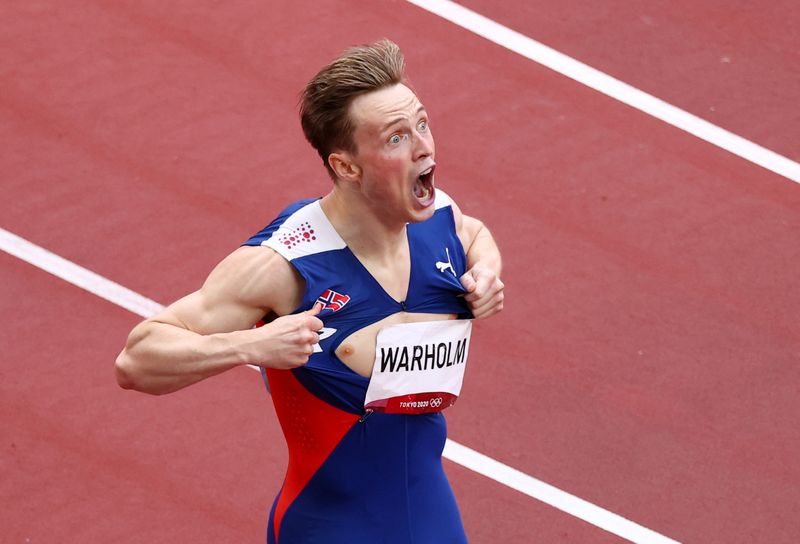OSLO (Reuters) – Norwegian hurdler Karsten Warholm is not against innovation in sports but feels the new carbon-technology shoes are hurting athletes’ credibility, the men’s 400 metres hurdles champion at the Tokyo Olympics told Reuters.
Karsten Warholm shaved off his own world record by .76 of a second – a massive margin in a one-lap race – to hold off American Rai Benjamin to win in Tokyo in what would be remembered as one of the all-time great Olympic races.
Benjamin took silver in 46.17, also half a second inside Warholm’s previous record of 46.70 while Brazilian Alison dos Santos took bronze in 46.72 as six of the first seven finishers set national or continental records.
Following his victory Warholm spoke out to criticise the thick-soled shoes of Benjamin, despite also wearing spikes with a carbon plate that unquestionably improves performance.
“What I said was misunderstood in some way, because I had one comment about it after the race and it just blew up and that wasn’t my plan at all,” the 25-year-old said during an interview.
“To be honest I don’t know if that shoe (Nike) is the best shoe. My shoe (Puma) is maybe just as good, but that’s not what it is about, necessarily. I haven’t done the science.
“When somebody does a great performance now, everybody will question if it’s the shoe, and that is the credibility problem.”
With a super-speedy track at Tokyo’s Olympic Stadium to aid, Sydney McLaughlin also shattered her own world record ahead of fellow American Dalilah Muhammad also inside the old mark in the women’s race. The sprints also witnessed fast times.
Warholm said he wanted athletes and not technology to get more credit and would want whoever breaks his record in future to be simply better than him.
“Hopefully somebody is doing the research and hopefully World Athletics are there to protect both athletes but also the audience,” he said.
“People sitting at home. I don’t want them to feel like they’ve been fooled or tricked. I want there to be credibility.
“And that’s what I feel the sport of track and field is all about. You can compare things. Yes there will always be small differences … even though I’m all for technology pushing it a little bit forward, in all sports.”
EMOTIONAL CELEBRATION
When he saw the astonishing time after going past the finish line in Tokyo, Warholm looked in shock. He ripped his vest apart and beat his chest in celebration before sinking to his knees.
“I was just a bit embarrassed that I wasn’t able to rip the shirt like fully off,” he said with a smile.
“But it was a lot of emotions … it’s something that I wanted really bad. Also with the Olympics it’s not a medal that you can go out and fight for every year.
“I knew that this was the moment that I really just had to grab with both hands because it’s not that many times you get the chance to be in perfect shape during the Olympics and it was very important for me to win.”
Warholm, a two-time world champion in 400m hurdles, said he was ready to try new events.
“The first natural one would be the 400m without hurdles, and I’m going to do that already at the end of this month in Switzerland,” he said. “And you know probably do one or two more before the season ends. But I haven’t decided.
“I’m also dreaming about doing a great 800 once, but that’s going to take some years and it’s going to take a different type of training. So I’m not ready to go there just yet.”
(Writing by Sudipto Ganguly in Mumbai; editing by Christian Radnedge)






















